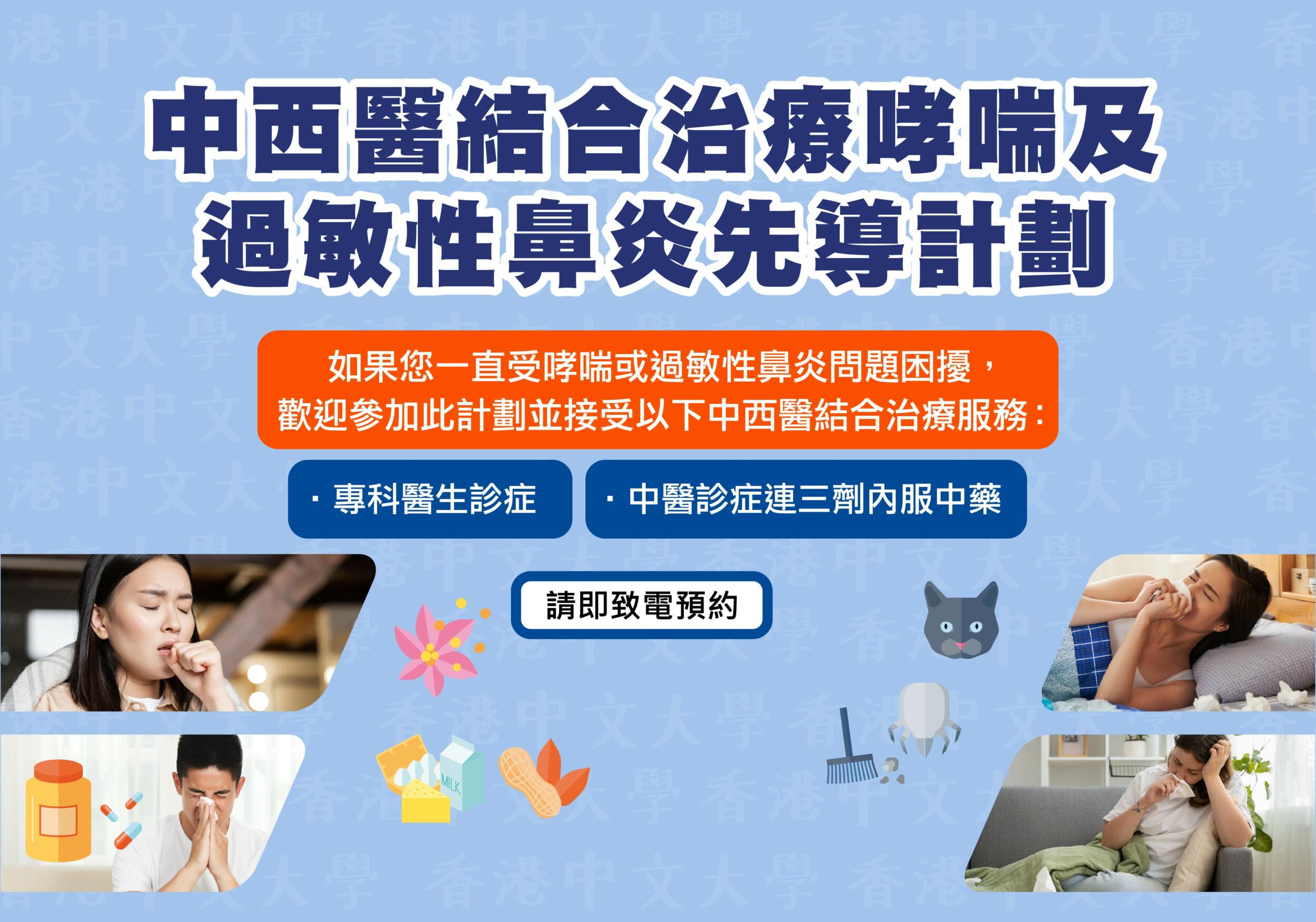Events
Integrative Medicine Treatment in Asthma and Allergic Rhinitis: A Pilot Service Program
20 Oct 2023
Shatin: 4L, 4/F, Day Treatment Block, Prince of Wales Hospital
Wan Chai: Flat B, 1/F, Southorn Mansion, 1 Luard Road
CUHK Campus: 1/F, Sino Building, Chung Chi College, The Chinese University of Hong Kong
2873 3100 (Shatin)/ 2873 3053 (Wan Chai)/ 3943 9933 (CUHK Campus)
E-mail: imc.info@cuhk.edu.hk (Shatin & Wan Chai) / scmclinic@cuhk.edu.hk (CU Campus)
(Please mention “Integrative Medicine Treatment in Asthma and Allergic Rhinitis: A Pilot Service Program” when you call up).
Understanding Asthma and Allergic Rhinitis
Asthma and allergic rhinitis are two major chronic diseases in children and adults. Patients who suffer from asthma can experience coughing, breathlessness and wheezing when airway narrowing takes place, which can be induced by a wide range of triggers. On the other hand, symptoms of allergic rhinitis such as sneezing, runny nose and nasal congestion, are the results of allergic reaction of the nose. Environmental changes, diets and emotions are some common triggers of the above disorders; hence, health management skills are required in preventing symptom exacerbations. Western medicine usually categorizes treatment into acute attack treatment and long-term treatment, and prescription includes oral medication and inhalers. Inhalers are the most effective way to deliver medicine to lungs while oral medication is naturally absorbed by the intestinal tract to produce effects.
Chinese Medicine Treatment on Asthma & Allergic Rhinitis
From Chinese medicine perspective, the deficiency of lung, spleen and kidney eventually impair water metabolism in the body, the internal retention of phlegm will cause symptoms of asthma. In intermittent asthma, Chinese medicine treatment aims to coordinate zang-fu organs, regulate qi-flow and eliminate phlegm. In mild, moderate and severe persistent asthma, specific treatment strategies will be made based on syndrome differentiation.
In allergic rhinitis, methods of replenishing and purging are applied according to different syndromes such as lung deficiency, spleen deficiency and lung-heat. With adequate empirical evidence, Chinese medicine has demonstrated its advantages in the treatment of asthma and allergic rhinitis, and both herbal decoctions and acupuncture are effective in alleviating symptoms. Chinses medicine also promotes physical and emotional wellbeing by different means, namely psychosomatic wellness training and Qigong. For patients who do not use herbal decoction or acupuncture, acupoint herbal paste application therapy can be an alternative treatment method.
Mechanism of Asthma
As indicated by Hong Kong Asthma Society, children with mild and occasional symptoms are easier to recover fully from asthma, but more than 20 percent of patients have relapses in adulthood. Therefore, early intervention is critical. The aetiology of adult-onset asthma is comparatively complicated, common factors include virus infection, medications, emotional instability, obesity and exposure to chemicals. The heterogeneous symptoms in adult asthma are sometimes ambiguous, patients are encouraged to seek medical help as early as possible when symptoms develop. Besides, study indicates that allergic rhinitis in school-age children can affect their social performance and academic achievement, suggesting the importance of early intervention.
Integrative Medicine Approach Enhances Treatment’s Effectiveness
Apart from medication treatment, identifying and avoidance from allergens are equally important, as asthma and allergic rhinitis can be triggered by allergens such as pollens, dust mites and food. Therefore, recognizing allergens is a key to lowering the risk of severe asthma attack and allergic rhinitis. If your family or you are encountering the aforementioned diseases, you are welcome to participate in the “Integrative Medicine Treatment in Asthma and Allergic Rhinitis: A Pilot Service Program” to control symptoms with integrative medicine treatment. Chinese medicine practitioner and western medicine specialist will communicate on treatment plan regularly to ensure patients receive proper integrative medicine treatment at different stages. If necessary, allergy test results will also be considered in order to offer the most suitable intervention. Lastly, the chronicity of asthma and allergic rhinitis may cause distress in patients and their caregivers. Hence, emotional support will also be provided as an integrative approach.
For more information, please visit: https://cuhk.hk/imaa
• This program only applies to the service provided by designated specialist and Chinese medicine practitioners in the Integrative Medical Centre, Hong Kong Institute of Integrative Medicine and The Chinese University of Hong Kong Chinese Medicine Specialty Clinic cum Clinical Teaching and Research Centre.
• All treatment plans are subject to clinical judgement.
• Medication cost is not included in specialist consultation.
• The 3 doses of Chinese herbal medicine are in concentrated granules or decoction pieces (for internal intake) only, extra or precious Chinese medicine cost are excluded.
• Additional doses of Chinese medicine granules /herbs are charged at $50 per dose (original price at $80), extra or precious Chinese medicine cost are excluded.
• The charges are applicable to “Integrative Medicine Treatment in Asthma and Allergic Rhinitis: A Pilot Service Program” only. It cannot be used in conjunction with other program.
• Integrative Medical Centre, Hong Kong Institute of Integrative Medicine and The Chinese University of Hong Kong Chinese Medicine Specialty Clinic cum Clinical Teaching and Research Centre reserve the right of final decision.


